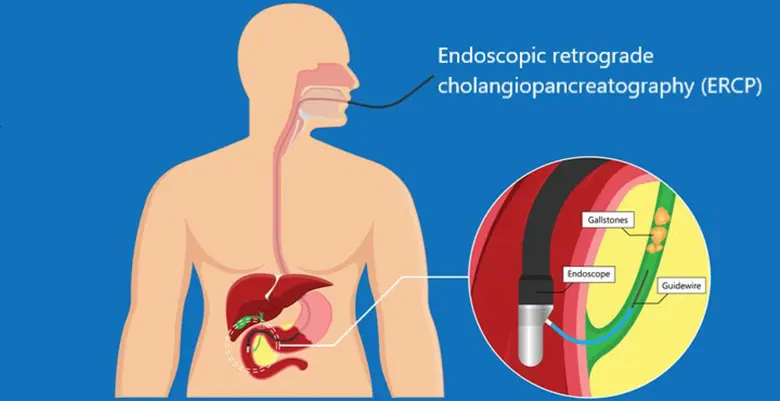
Endoscopic Retrograde Cholangiopancreatography (ERCP)
What is ERCP?
Endoscopic retrograde cholangiopancreatography (ERCP) is a diagnostic procedure that is used to diagnose and treat diseases of the bile and pancreatic ducts.
What are bile and pancreatic ducts?
Bile and pancreatic juices support digestion. Bile ducts carry bile from the liver to the gall bladder and small intestine. The ducts merge into a common bile duct that empties into the small intestine.
Pancreatic ducts transport pancreatic juice from the pancreas to the small intestine. Small pancreatic ducts empty into the main pancreatic duct that leads into the small intestine.
How it works
ERCP uses a combination of X-rays, endoscopy and injectable dyes to visualise organs and vessels clearly. During the procedure, your doctor will use a catheter, a thin flexible tube equipped with a light and camera. Your doctor can use the catheter to:
- Guide the camera to the area of the small intestine where the bile and pancreatic ducts connect.
- Thread small tools through the catheter to perform various procedures.
- Squirt dye into the bile system and pancreas to highlight all the vessels.
- Take X-rays to form a clear and detailed picture.
Why do you need ERCP?
ERCP may be recommended to diagnose, assess and treat symptoms or conditions such as:
- Infection in the bile ducts
- Unexplained upper abdominal pain
- Unexplained yellowing of the skin or eyes (jaundice)
- Lesions, tumours or cancer in the pancreas, gall bladder or liver
- Acute and chronic pancreatitis (inflammation of the pancreas)
- Gallstones or blockages of the bile ducts
ERCP is also used before and after gall bladder surgery to better plan the surgical procedure and monitor outcomes.
What are the risks and complications of ERCP?
ERCP is a safe procedure. However some uncommon, but potential complications include:
- Excessive bleeding
- An abnormal reaction to the sedative
- Infection of the bile ducts or gall bladder
- Pancreatitis (inflammation of the pancreas)
- Tearing of the bile or pancreatic ducts, or near the small intestine opening
- Tissue damage from X-ray exposure
Potential risks vary, based on your health and pre-existing conditions. Our doctors will review your medical history to carefully assess your suitability for the procedure.
Why choose Mount Elizabeth Hospitals?
Mount Elizabeth Hospitals are established private hospitals in Singapore that provide fully integrated gastroenterology care. Your ERCP treatment and patient journey will be supported by our multidisciplinary team of experienced specialists, as well as skilled nurses and therapists.
We provide modern endoscopic equipment, complemented by a full suite of ancillary support in ultrasound, X-ray, and magnetic resonance imaging (MRI) services.
Find doctors from our allied hospitals
We offer a full spectrum of healthcare services under IHH Healthcare Singapore.
Check if your preferred hospital offers this treatment:
This page has been reviewed by our medical content reviewers.
Need help?
For enquiries, please call
+65 6250 0000 (Orchard) or +65 6898 6898 (Novena)
For appointment bookings, please WhatsApp
+65 8111 7777 (Orchard) or +65 8111 5777 (Novena)
 Brain & Spine Care
Brain & Spine Care



